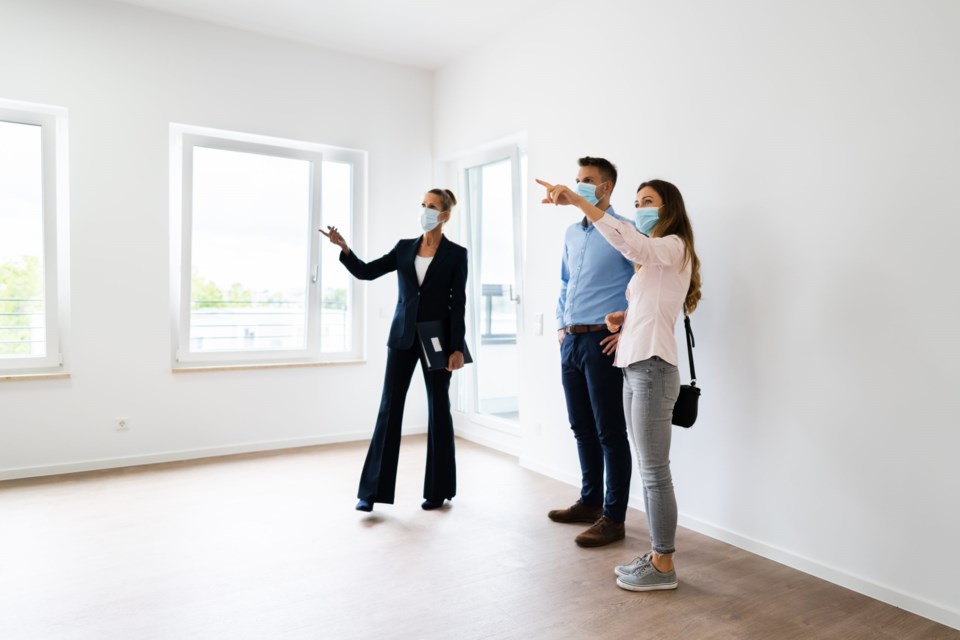Greater Victoria’s real estate market hit an inauspicious landmark this week: The first month in which sales reached $1 billion.
The capital’s housing market is as red-hot as the rest of the province, which is to say prices are skyrocketing at an astronomical rate.
The number of sales in Greater Victoria in March was up 93 per cent from the same time last year, the benchmark value for a single-family home rose to $968,700 from $879,600 in March 2020 and the average value of a single-family home hit $1.18 million.
It was much the same story in Metro Vancouver, where residential sales were up more than 126 per cent from last March. Delta saw a staggering 195.8 per cent increase in sales in one year, followed by 194.7 per cent in Whistler and 188.6 per cent in Squamish. As price gains continue in the double digits, the benchmark for a detached home rose 18 per cent to $1.7 million.
Increasingly, economists are sounding the alarm on the real estate sector’s out-of-control growth.
Homes are going for hundreds of thousands of dollars over asking in bidding wars, in which buyers are offering cash for properties sometimes sight unseen, and forcing others to place bids without basic precautionary conditions like a home inspection.
It is, in a word, unsustainable.
Among the most interesting ideas to cool the market in recent months is a capital gains tax on primary residences.
The Bank of Montreal’s research division put its weight behind the idea in a report this week, saying that a version of this tax that expires five years after you purchase a home would help curb speculation and property-flipping.
“This could easily crowd out speculation, and alter market psychology,” read the report.
“A similar concept was used in Ontario in the 1970s, and it weakened the market overnight.”
Canada already has a capital gains tax on non-principal residences; half of the profit of a sale is taxed at a variable rate depending on your income and circumstances.
But principal residences have long been exempt, with the argument Canadians should be free to buy, sell, and reap the financial rewards from playing the real estate market – if it’s the primary property they live in.
Going after the profits of primary home sales is one of the sacred cows of Canada’s real estate sector.
Perhaps not surprisingly, real estate associations are fighting the idea vigorously; it would undercut their growth and revenues.
“While prices may experience a temporary decline, strong demographic demand and a pullback of supply may mitigate much of the hypothetical improvement in affordability over the medium term,” Brendon Ogmundson, chief economist for the B.C. Real Estate Association, wrote in an op-ed in Saturday’s Vancouver Sun.
“Furthermore, a negative shock to housing wealth caused by the implementation of a capital-gains tax will have further consequences for the Canadian economy.”
Still, calls for such a tax are rising.
Royal Bank of Canada earlier this month also called on politicians to consider the idea.
“Many Canadians believe the policy environment guarantees property values will rise indefinitely,” read the report.
“Policymakers should put everything on the table, including sacred cows like the principal residence exemption from capital gains tax. These considerations will be complex, controversial and no doubt fraught with unintended side-effects.”
The Globe and Mail’s editorial board also endorsed the idea, saying it will be an unpopular but perhaps necessary solution to a “bonkers” market.
All three organizations agree: Politicians need to intervene with new ideas.
Other suggestions RBC put on the table include a hike in key interest rates by the Bank of Canada, new transparency measures in the bidding process to prevent runaway overbidding, tighter mortgage rules, and a foreign buyer’s tax similar to the one already in place in B.C.
Of course, increasing supply, and removing red tape in the municipal approval process for new housing, remain critical parts of any solution.
Most of the tough decisions on this file will have to be made by the federal government.
B.C.’s Ministry of Finance says it doesn’t have jurisdiction to consider something like a capital gains tax – technically true, but the province could do a fair bit of creative taxation if it wanted to, and could also throw its weight behind the idea of a capital gains tax in a very public way.
The problem is simply political courage.
What politician wants to start taxing profits in real estate, and weather the backlash from homeowners already in the market, and who will (rightly) say they haven’t done anything wrong?
What politician wants to take on the real estate sector and all related subsectors of the economy raking in money as housing affordability worsens?
It seems especially unlikely with Prime Minister Trudeau considering an early election. No party will rush to include a capital gains tax in its campaign platform.
Still, it’s not as if potential solutions to our housing crisis aren’t out there. They are. Smart people are thinking up ways to cool our market and return some sense of normalcy. All that’s required is political courage to make it so.
Rob Shaw has spent more than 13 years covering BC politics, now reporting for CHEK News and writing for The Orca. He is the co-author of the national best-selling book A Matter of Confidence, and a regular guest on CBC Radio.
SWIM ON:
- Rob Shaw last wrote that after a year of mostly getting it right, the province has had a series of pandemic communications mishaps, creating a very real risk of undermining public confidence.
- Even in 2019, Ryan Berlin pointed to signs that housing demand in Greater Vancouver was resurgent.
- In Vancouver's housing market, it's the Roaring '20s, says Ada Slivinski.



